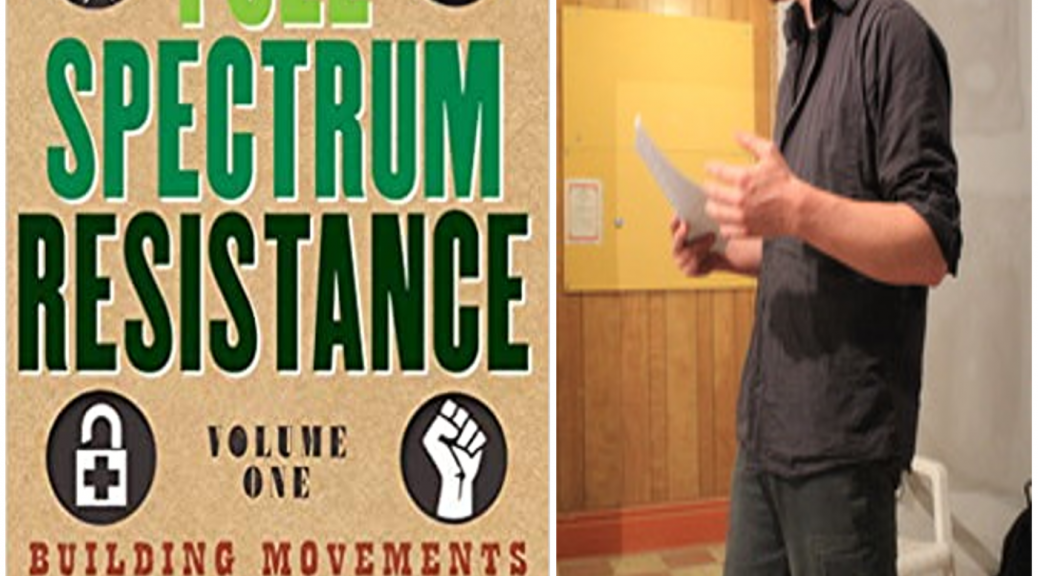Aric McBay on “Full Spectrum Resistance”

This week we are re-airing a conversation that Bursts had last year with Aric McBay, who is an anarchist, organizer, farmer, and author about his most recent book called Full Spectrum Resistance published by Seven Stories Press in May 2019. This book is divided into 2 volumes, and from the books website [fullspectrumresistance.org]:
“Volume 1: Building movements and fighting to win, explores how movements approach political struggle, recruit members, and structure themselves to get things done and be safe.
Volume 2: Actions and strategies for change, lays out how movements develop critical capacities (from intelligence to logistics), and how they plan and carry out successful actions and campaigns.”
This interview covers a lot of ground, with topics that could be of use to folks newer to movement and ones who have been struggling and building for a while. McBay also talks at length about the somewhat infamous formation Deep Green Resistance, some of its history, and tendencies within that group that led him to break with them.
Links to Indigenous and Migrant led projects for sovereignty and climate justice, and some for further research:
- Wet’suwet’en Strong [groundworkforchange.org/wetsuweten-strong.html], which includes extensive educational material on allyship, racism, settler colonialism, and decolonization.
- Interview on TFS with Smogelgem, a Wet’suwet’en Hereditary Chief of the Likhts’amisyu clan, on ongoing struggles against pipelines and moves to create a Wet’suwet’en lead climate change research facility on their lands at Parrot Lake.
- Indigenous Environmental Network [ienearth.org]
- Migrant Rights Network [migrantrights.ca/about]
- Igniting a Revolution, Voices in Defense of the Earth [akpress.org/ignitingarevolutionak.html] eds. Steven Best & Anthony J. Nocella, II
- Judi Bari, Revolutionary Ecology [judibari.org/revolutionary-ecology.html]
Links for more reading from Aric McBay:
- fullspectrumresistance.org
- aricmcbay.org
- Aric McBay on Facebook (search “Aric McBay Author”)
Announcements
Xinachtli Parole Letters
Chicano anarchist communist prisoner, Xinachtli, fka Alvaro Luna Hernandez, has an upcoming parole bid and is hoping to receive letters of support. Xinacthli has been imprisoned since 1997 on a 50 year bid for the weaponless disarming a sheriff’s deputy who drew a pistol on him at his home. The last 19 years of his incarceration have been in solitary confinement. Details on writing him letters and where to send them can be found at his new support site, FreeAlvaro.Net, as well as his writings and more about him. He is also one of the main editors of the Certain Days political prisoner calendar, author and a renowned jailhouse lawyer. Parole support letters are requested no later than March 20th, 2021.
Mumia has Covid-19
It was announced last week that incarcerated educator, broadcaster, author, revolutionary and jailhouse lawyer Mumia Abu-Jamal has been experiencing congestive heart failure and tested positive for covid-19. There are actions scheduled in Philadelphia before the airing of this broadcast, but you can find more info and ways to plug in at FreeMumia.Com
Transcription, Zines, Support…
Thanks to the folks who’ve been supporting this project in various ways. You can pick up merch or make donation that support our transcription work with the info at TFSR.WTF/Support. Our transcripts are out a week or so after broadcast and we’re slowly starting to transcribe older episodes. Zines can be found at TFSR.WTF/Zines for easy printing and sharing. You can find our social media and ways to stream us at TFSR.WTF/links and learn how to get us broadcasting on more radio stations at TFSR.WTF/radio! Thanks!
. … . ..
Featured Tracks:
- kidsnextdoor – Carmack Stackin That Brass (Creative Commons)
- Fennec Beats – I just feel sometimes (Creative Commons) (loop created by William)
- Angels Sing by Apollo Brown from Trophies
- U.N.I.Verse at War by The Roots from Instrumentals Album

